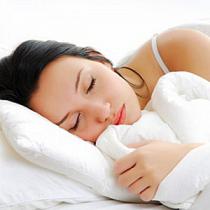Lack of sleep linked to Belly Fat
Is there a sleep and belly fat connection? Have you experienced bringing out old clothes from your wardrobe and being surprised that it doesn't fit you anymore? The obvious reason would be that you gained some weight. Naturally, you'd lessen your food intake and go on a diet. However, this is not always the case. There are times when you're still unable to shed those extra pounds in spite of being on a strict diet. Did it ever occur to you to check if you are having the right amount of sleep? There is a connection between sleep deprivation and your waist size. Who knew it? People do not realise that chronic sleep deprivation puts the body in a state of chronic stress. Studies have shown that people who get less than 4 hours of sleep are 70 percent more likely to be obese than those who get 7-9 hours per night. People who sleep less than 6 hours eat more caloric food and their metabolism is slower, which leads to increased fat deposition and guessed what- the fat goes around the waist. Any stressful situation leads to high adrenaline, cortisol and insulin production, which puts the body in the classic fight or flight mode. Sleep deprivation (sleep less than 7 hours/24h)is a typical chronic stress situation that makes it harder to control food cravings because it lowers leptin (hormone that suppresses the appetite) and disrupts the normal ability of the body to control insulin. What is the result of this sleep and belly fat connection? The result is lower fat-burning ability of the body, hence the accumulation of fat around the waist. Keep in mind that both quantity and quality of sleep matter. It is not only about how many hours you sleep. It is also about how well rested you get up. Here are some suggestions for improving your sleep: Create a routine for bedtime Go to bed at approximately the same time), don't eat, work or watch TV in bed. Watching TV is particularly harmful. Watch TV in the living room and when it is time to sleep, go to your dark and quiet bedroom. Make sure the temperature in your bedroom is lower than the rest of the house or keep your windows open at night (if possible). Your mind needs to associate the bed with relaxation not with work or watching TV. Avoid food at least 2 hours before bedtime Food high in sugar, coffee, caffeinated tea and alcohol can keep you awake for hours. Alcohol also makes you snore. If you are snoring or experiencing other kind of sleep apnea you need professional advice because you don’t get the rest you need and more importantly your heart is not getting a break. It all adds up to and leads to more stress and an increased risk for high blood pressure, and heart disease. Use natural products that contain tryptophan Tryptophan is known to make sleep come faster. Some people find that a cup of cold milk with a teaspoon of honey help them go to sleep. You may have your own recipe from grand ma- don’t hesitate to try it. Who knows- it might do the magic. Create a relaxing atmosphere before your bedtime Don't argue, and don't try to solve all the of the world's problems. Listen or read something that soothes you. No strenuous physical activity Don't go to the gym at least 2 hours before you go to bed. Never exercise or make a physical effort right before you go to bed. Take a bath with soothing herbs. Find out how the ancient Chinese art Feng Shui can improve your sleep. can help deal with night sweats, and hot flashes. The condition of your mattress and pillow is very important for your sleep and belly fat. Make sure you change your pillow at least once a year and that your mattress and spring box are comfortable. Same goes for your night clothing. Use large, ample clothing, made of natural materials like cotton or silk. Don't go to bed with clothing you wear during the day. To nap or not? There is nothing wrong if you take a nap during the day. In some European countries they even close the stores to allow employees and customers to have an afternoon nap. If you get a chance- do it- 15-30 min of napping can be very refreshing (speaking from personal experience). In conclusion: There is a connection between sleep and belly fat that is due to schronic stress accumulation. To find out where you stand in terms of sleep and belly fat risk, get started by measuring your waistline and taking the free Stress Level Test About the writer: Dr. Nelly Stoyanova is a physician, medical researcher and health behaviour expert. She studies the effects of stress on heart disease, type 2 diabetes and sleep. Her website: Belly Fat, Stress and Baby Boomers (http://www.stress-fat-heart-solutions-for-boomers.com) evaluates sources of stress for people over 50 and provides great tips to balance your day-to-day stress and stay healthy.
Comments
There are 0 comments on this post













